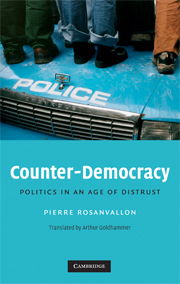Part 3 - The people as judge
Published online by Cambridge University Press: 24 May 2010
Summary
Oversight and prevention are two ways of constraining governments, two ways in which society can exert pressure apart from the ballot box. Judgment is a third way of putting power to the test. To judge conduct or action is to subject it to scrutiny. It is a radical extension of the idea of oversight. It raises suspicion to the next level by insisting on a definitive conclusion. It is thus yet another form of popular control of government. The kind of judgment I have in mind extends beyond the strict framework of the law and the courts. It includes detailed and reasoned evaluation, a process of examination leading to the resolution of a question. Voting and judging are two distinct methods of working toward a common goal: coming to a decision that will contribute to the general welfare. Both are political forms, and as such they can be contrasted and compared. Each contains an element of “power as the last word.” For understandable reasons, citizens might want to pursue both avenues, seeking to obtain as judges what they feel they have not been able to achieve as voters. At times they may be able to exercise judgment directly: when they sit as jurors in a formal proceeding, for example. More broadly, citizens act as judges when they participate in various kinds of investigation, whether through the media or as political activists. Even when judgment is “delegated” to the courts, it retains a societal dimension.
- Type
- Chapter
- Information
- Counter-DemocracyPolitics in an Age of Distrust, pp. 191 - 194Publisher: Cambridge University PressPrint publication year: 2008

